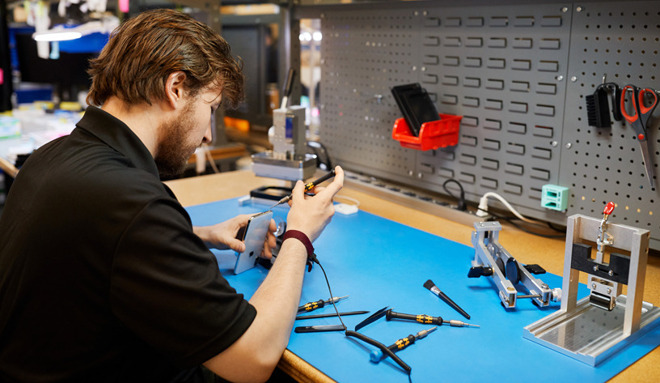European Parliament votes to facilitate consumer right to repair
The European Parliament on Wednesday voted to support the right of consumers to repair their own phones, tablets, laptops and other devices without going through the companies that produced them.

Credit: Apple
The resolution, a report of recommendations to facilitate the right to repair, was passed with 395 votes in favor and 94 against, with 207 abstentions. As Euronews points out, it's only an advisory report, and it's still up to the European Commission to issue actual proposals.
"By adopting this report, the European Parliament sent a clear message: harmonized mandatory labelling indicating durability and tackling premature obsolescence at EU level are the way forward," said Rapporteur David Cormand, MEP from France.
The vote calls for the European Commission to "develop and introduce mandatory labelling, to provide clear, immediately visible and easy-to-understand information to consumers on the estimated lifetime and reparability of a product at the time of purchase."
Right to Repair Europe Right to Repair Europe Chloe Mikolajczak told Euronews that the move is a step in the right direction.
"Despite the political divisions, because there is a clear political division on this issue between conservatives and the progressives, we are seeing that the European Parliament is finally upholding its reputation as a defender of consumers' rights and environmental issues," she said.
Repair site iFixit notes that a recent EU survey found that 77% of EU citizens would rather repair a device than replace, and 79% thought that manufacturers should be legally obligated to facilitate the repair of devices or the replacement of parts.
Among the other provisions of the report, the motion calls for the assignment of repairability scores similar to those pioneered by iFixit. It also recommends compelling companies to provide instructions on how to repair devices, something that device makers like Apple don't do.
Apple has publicly opposed right to repair legislation in the U.S., arguing that it could threaten consumer safety and device security.
Internal communications between Apple staffers suggest that there is still debate and uncertainty surrounding right to repair policies within the company.

Credit: Apple
The resolution, a report of recommendations to facilitate the right to repair, was passed with 395 votes in favor and 94 against, with 207 abstentions. As Euronews points out, it's only an advisory report, and it's still up to the European Commission to issue actual proposals.
"By adopting this report, the European Parliament sent a clear message: harmonized mandatory labelling indicating durability and tackling premature obsolescence at EU level are the way forward," said Rapporteur David Cormand, MEP from France.
The vote calls for the European Commission to "develop and introduce mandatory labelling, to provide clear, immediately visible and easy-to-understand information to consumers on the estimated lifetime and reparability of a product at the time of purchase."
Right to Repair Europe Right to Repair Europe Chloe Mikolajczak told Euronews that the move is a step in the right direction.
"Despite the political divisions, because there is a clear political division on this issue between conservatives and the progressives, we are seeing that the European Parliament is finally upholding its reputation as a defender of consumers' rights and environmental issues," she said.
Repair site iFixit notes that a recent EU survey found that 77% of EU citizens would rather repair a device than replace, and 79% thought that manufacturers should be legally obligated to facilitate the repair of devices or the replacement of parts.
Among the other provisions of the report, the motion calls for the assignment of repairability scores similar to those pioneered by iFixit. It also recommends compelling companies to provide instructions on how to repair devices, something that device makers like Apple don't do.
Apple has publicly opposed right to repair legislation in the U.S., arguing that it could threaten consumer safety and device security.
Internal communications between Apple staffers suggest that there is still debate and uncertainty surrounding right to repair policies within the company.

Comments
Don't forget the tools you will have to buy to do the fix.
You're exaggerating. Just because people are given the right to repair their iPhones, does not mean that everybody will start doing so. People have to buy tools and have the knowledge. From what I've noticed, people who don't know how to repair phones don't even bother with it and just have professionals repair it for them.
No. The crux is non-replaceable batteries. That’s it. Since we’re actually talking about lithium batteries, that’s an issue on several fronts.
The difference between right-to-repair on cars and right-to-repair on Phones is that if an iOS "private signing key" is compromised by some third party shop, ALL phones are compromised, since these private keys are on all iOS devices, not just on the phone that was repaired at that shop. I don't expect the average person in the unwashed masses to understand this, and Apple hasn't made this argument yet.
Yet another straw man argument. If a device is damaged from a 3rd party repair, it’s the 3rd party’s responsibility. Duh. The only people who expect Apple to be responsible for someone else’s work are the people making these arguments.
I take my car to the neighborhood repair shop and get a new battery. And brakes. And alternator. If the computer gets fried they tell me I need to go to the dealer to have them reprogram it. And my car is working perfectly despite all these incompetent hacks working on it that are clearly a menace to society because they don’t work for Honda. Hmmm. I assume everyone complaining here never goes anywhere except the dealer to get their car fixed? And they never use anything except OEM parts?